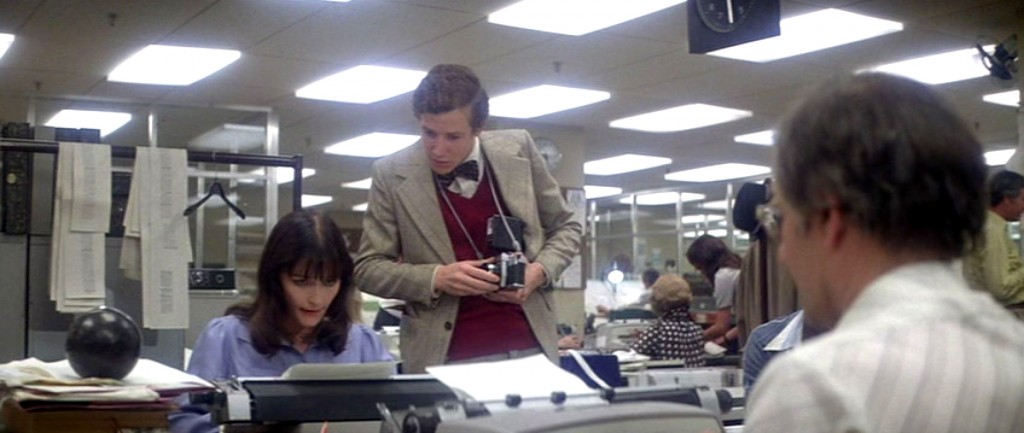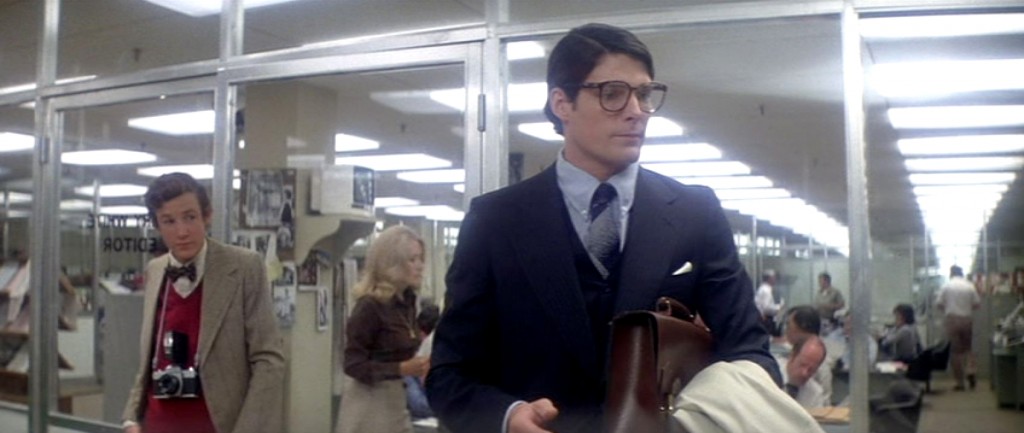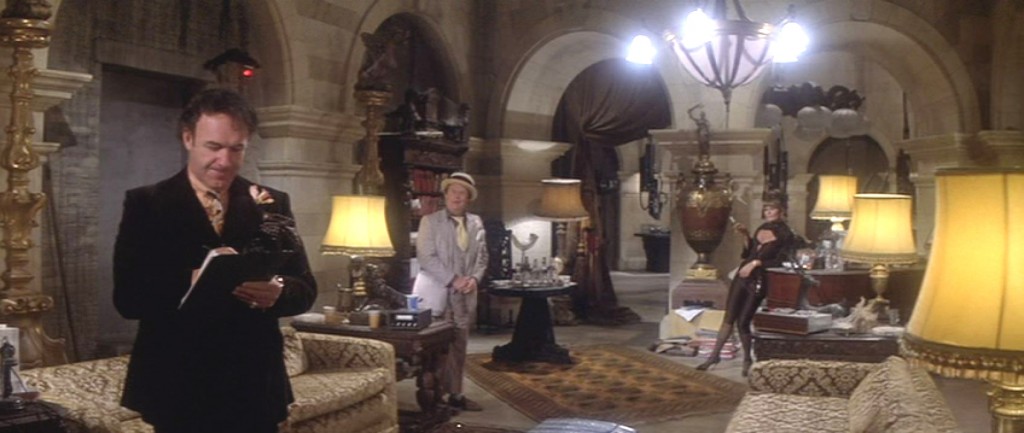Superman: Superman: The Movie part 3
Superman is 49 minutes old and its protagonist has arrived at his fourth home: Metropolis, for which the movie doesn’t bother disguising Manhattan. Keep in mind, this is not the Manhattan of today, with the theme-park Times Square. This is the Manhattan of 1978, the Manhattan of Taxi Driver and Death Wish, the Manhattan of the 1977 blackout and the looting that followed, the broke Manhattan, the Manhattan Gerald Ford had told to drop dead. In the Manhattan of 1978, it was considered suicide to enter Central Park after sunset. As far away from Krypton as Kansas was, Metropolis is as far away from Kansas. The shift in production design is immediate and impactful: there are no vistas or lone figures in windswept fields, the streets of Metropolis are skyscraper canyons and the offices of the Daily Planet crowded and buzz with life. Lois Lane’s first line is “How many ‘t’s in ‘bloodletting?'”
This is the world Clark Kent enters into. And yes, there is an element of put-on to Kal-El’s assumption of the nerdly Kent. The glasses, theoretically at least, disguise his identity and identify him as weak, or, at least, downplay his massive physicality, and he gives himself a haircut just this side of Alfalfa in terms of dorkiness, but in his heart he’s still the outcast boy from Smallville. He loves his silver-haired mother and the big mean city is still a frightening place to him.
It seems apparent that he’s come to Metropolis to fight crime, the crime in Smallville being negligent I suppose. The question is, why join the staff of the Daily Planet? Why not just read the Daily Planet, or watch TV, or fly around at night listening through walls to find out what’s going on in the world? Just as Bruce Wayne in The Dark Knight seeks to leave the cape behind and fight crime as a billionaire, Kal-El comes to the big city and join a newspaper to fight crime in both his identities. He wants to be a crusading journalist and dash around saving people in need.
Lois Lane is immediately charmed by the big dork, and there’s a plot point lifted from Mr. Deeds Goes to Town, in which the big-city journalist is paired with the small-town eccentric. Clark Kent may be a disguise, but there’s no reason why he must be a bumbling, stuttering doofus. One look at sassy career-gal Lois and we’re worried that she’ll eat him alive. But Clark’s dorkiness has a significant narrative purpose: it immediately puts the audience on his side. Not because he’s so lovable, but because he’s got a secret, and he’s playing a trick on everyone in town. Because Clark knows he superior, it makes the audience feel superior – these big-city hoo-has, we know, has nothing on the bumbling young man from Smallville. Which, again, suggests that the filmmakers intend for Clark Kent to be Superman’s true identity: they want us to love Smallville, love Kansas and love the heartland values of the Kents, they want us to see the big city as being filled with phonies and blowhards.
Clark and Lois encounter a mugger while walking downtown. Lois tries to dodge him but Clark comes on like a boy scout and gets shot for his troubles. And I’d like to take a moment here to talk about the great Lois Lanes down through the ages. Margot Kidder’s Lois is jaded and cynical, but she screams when shot at and expresses fear when plummeting out of a helicopter. The two great Lois Lanes, the one in the Fleischer cartoons and the one in the Bruce Timm cartoons, consistently rush headlong into danger and refuse to exhibit fear even when in the mouth of a 200-foot dinosaur. Lois Lane, I think, is best when fearless and brassy. All Loises are brassy, but few are fearless. Amy Adams, a superlative actress, is nevertheless not quite there in Man of Steel — she worries when trapped in an alien spaceship and screams when shot by an alien death-ray. The Fleischer Lois would probably be put out by being shot by alien technology, but when Superman told her he’d have to cauterize the wound with his heat vision, her response would be “Then hurry up about it, I’ve got a story to write!”
An hour into Superman, a plot introduces itself and the filmmakers break faith with their audience. Lex Luthor appears. In his Batman-villain lair he recites to his idiot minions Otis and Miss Tessmacher the qualities of his awesomeness. In love with himself, he is convinced he is a genius, but he is, in fact, the opposite of a genius – he is a fool who repeatedly declares he is a genius. Why would a genius employ two (sorry) comic-book idiots of no useful purpose as henchmen? Why would he pursue schemes that make no sense whatsoever? The character of Lex Luthor in Superman (which repeats itself all the way through to Superman Returns) is nothing less than an insult to the audience that the filmmakers have spent an hour trying to seduce. Come in, they’ve said, we’re going to give you grand myth, we’re going to make you take a comic-book character seriously, we’re going to make you believe a man can fly, we’re going to show you the soul of America. Then, when it comes time to introduce the piece’s villain, they give us a broad caricature of evil-genius that a Bond movie would give a wide berth, which is saying a lot: the last Bond villain seen onscreen in 1978 was The Spy Who Loved Me‘s Stromberg, who had webbed hands, lived in a city at the bottom of the ocean and wanted to destroy the world by capturing nuclear submarines with a gigantic submarine-nabbing supertanker, and his plan still makes more sense than Lex Luthor’s, and his role is presented with more geniune menace.
Why did the filmmakers choose to have their protagonist fight this Lex? The answer lies in the paragraphs above: Clark Kent is from Smallville, but he’s “good” and “true” and fights for “truth and justice.” He has all the power in the world but disguises himself as a mild-mannered reporter. Lex Luthor, on the other hand, is a raving, oily egomaniac, the ultimate blowhard cynic in the big city of blowhard cynics. He keeps reminding people how brilliant he is because he thinks that’s how the world works, and, for what it’s worth, it is how the world works, in Metropolis anyway. (It’s not a coincidence that the only real-life journalist who appears in Superman is the ultimate blowhard cynic Rex Reed, as himself.)
If the battle of Kal-El/Clark Kent is between being a god and being a dork, the battle of Superman/Lex Luthor is between hype and the real thing, the America that stumbles around the world being a moron and the America that is still the greatest hope for mankind in the world (which is how we still thought of ourselves back then, despite Vietnam, Watergate, and the ruination of Manhattan). The concept of Lex in Superman is thematically sound, it’s the execution that presents a radical tonal shift, baiting us with myth and switching to a cartoon.
(As for his assistants, Lex has drooling potato-brain Otis and slatternly Miss Tessmacher because Clark has Lois and Jimmy Olsen.)
Before you know it, blowhard cynic career-gal Lois finds herself dangling from that helicopter. The scene is staged with all the requisite spectacle, but I wish the helicopter mishap sprang from plot instead of prompting it. What it does, dramatically, is require the emergence of the title character. Sixty-eight minutes into the movie, the movie begins. Superman saves Lois and we find that, in a way, Superman exists only to save Lois. That is, Lois, being that blowhard cynic career-gal, caught somewhere in between Smallville’s hay-chewing Lana Lang and Metropolis’s uber-cynic Lex Luthor, has not just a life but a soul up for grabs. She is, in her way, “where America is now,” wanting to believe in the goodness of Clark but needing to delve into the blood and guts in order to make a paycheck.
(“Nice suit!” cheers a street-wise black dude, dressed in an outfit just this side of “pimp.” “Pardon me,” demurs Superman, on his way to rescue Lois. Just so we know he’s cool.)



So both of the great Lois Lanes are animated ones? My, how very, very surprising. (Here ends the sarcasm.)
I wonder if any of the Superman movies would even include Luthor if they didn’t feel obligated to. Ant Superman movie is going to want to show off Superman’s powers and Lex isn’t great for doing that the way Doomsday or Metallo or the like might be. If Superman ever went toe toe with Lex in a straight up fight, it would be over in seconds. So instead of a villain who can challenge Superman, the movies have schemes that can challenge Superman. It could probably be better executed, but for sheer ease of getting Superman to do what he does best, I’d wager a few film makers wished that Clark’s archenemy was a huge, powerful brawler.
Yeah, both the great Lois Lanes are animated. And for that matter, the Bruce Timm Superman show is still a better showcase for the character than any of the movies have been.
For me, Lex gets weaker the more he fixates on killing Superman. A criminal mastermind should have bigger fish to fry than calling attention to himself.
It’s a shame in some ways that films won’t use the “evil scientist” version of Lex Luthor, which at this point would be a refreshing departure from the “evil tycoon” version.
I’m sure the Nolans will come up with something interesting.
When you get around to analyzing Superman II, I do hope your analysis includes a comparison of Donner’s restored DVD version to Richard Lester’s drastically inferior theatrical version.
Unfortunately, I feel the opposite. I find the Donner cut to be an incoherent mess.
The Donner Cut is still an unfinished work, so I don’t think it’s fair to judge on the merit of its story logic but through the lens of a script analysis, I can see why a screenwriter like yourself would be more critical. The reason the 1978 Superman holds a special place in my heart – and why I have no interest in seeing Man of Steel – is that up until Lex Luther is introduced, the film excels at delivering a level of tonality no other Superman film has achieved: a sense of awe and wonder that a man really COULD fly.
The Donner Cut, for the most part, preserves this tonality. Some films succeed on what they make you think, others in how they make you feel.
I disagree, I find the Donner cut to have the same tonality issues as the first movie, with a bunch of plot contradictions on top of it.
On the other hand, both movies set about giving Superman an impossible task, then, when they realize that the task is impossible, just give him a magic wand to complete it.
That’s not all that different from the Superman comic stories of the Seventies; the stories were usually 12 pages long and put Superman in an impossible bind on page 9. Page 10 would show the villain gloating and all of ‘Superman’s Pals’ acting baleful, on page 11 the problem would be solved, with a tenuous scientific explanation starting on the last panel of page 11 and continuing thru mid-page 12. The rest of page 12 would be ‘office hijinks’ at the Daily Planet (or the Global Broadcasting studio) with Clark getting some measure of revenge on Joe Namath stand-in Steve Lombard or Donald Trump stand-in Morgan Edge.
VERISIMILITUDE!
Also worth noting: This is the NYC that was still suffering PTSD from Son of Sam two years earlier.
The difference between Smallville and Metropolis is even more exaggerated in the film#s timeline which doesn’t quite add up. Smallville can only really be set in the 1950s, 1955 probably judging by the use of ‘Rock Around the Clock’. Superman is in self imposed exile for 12 years and arrives in 1978 New York. I’m sure that Kansas in the 1960s wasn’t the most happening place, but you’d expect that some of those cultural touchstones and the political upheaval of that era would have impinged on Clark Kent’s life.
Not only did he grow up a teenager in one of the most conservative locale and time he entirely missed the 1960s. This allows his (Smallville) values to remain untouched or challenged by what was going on but throws into even sharper focus the schism which occurred both temporaly and geographically.
Is there a more moving sequence in blockbusters than the funeral of Jonathan Kent? Death of a parent is a common theme in these films but I don’t think it’s been done as well as here.
The glasses, theoretically at least, disguise his identity and identify him as weak, or, at least, downplay his massive physicality
When I saw the first real trailer for Man of Steel, I remember thinking that Cavill looked pretty good in the suit. Then there’s the brief glimpse of him without a shirt on and I went HOLY MOTHER OF GOD HE’S HUGE.
It really hammered home to me just how big a guy has to be in order to look “right” as Superman. This is not “athletic guy” levels of physical fitness. It really is cranked up to 11, and beyond.
When they show Henry Cavill without his shirt, Man of Steel suddenly becomes a date movie. In the show I attended, you could suddenly hear hundreds of young men question their sexuality.